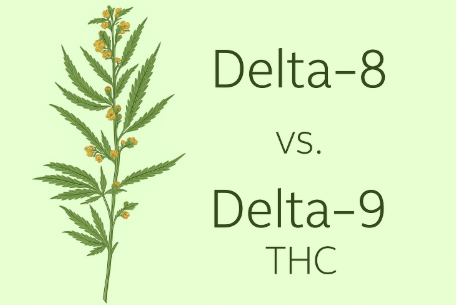
Delta-8 vs. Delta-9: Origins, Effects, Safety, and Legal Status Explained
Share
As the cannabis industry evolves, cannabinoids like Delta-8 and Delta-9 THC have gained popularity for their unique effects and accessibility. Understanding their origins, effects, safety profiles, and legal status is crucial for informed consumption.
Origins: Natural Occurrence and Production
Both Delta-8 and Delta-9 THC are naturally occurring cannabinoids found in cannabis plants. However, Delta-8 THC is present in much smaller quantities compared to Delta-9 THC. Due to its low natural concentration, Delta-8 is typically synthesized from hemp-derived cannabidiol (CBD) through chemical processes. This synthesis involves converting CBD into Delta-8 THC using acid-catalyzed reactions, resulting in products that are chemically similar to their naturally occurring counterparts.

Chemical Structure Differences
Delta-8 and Delta-9 THC are isomers, meaning they share the same molecular formula (C₂₁H₃₀O₂) but differ in the placement of a double bond in their carbon chain.
Delta-8 THC: The double bond is on the eighth carbon atom.
Delta-9 THC: The double bond is on the ninth carbon atom.
This slight variation in structure influences their interaction with the body's endocannabinoid system, leading to differences in their psychoactive effects and potency.
Effects and Potency
The effects of Delta-8 and Delta-9 THC can vary based on individual tolerance, dosage, and method of consumption.
Delta-8 THC: Known for its milder psychoactive effects compared to Delta-9 THC, Delta-8 may induce relaxation, euphoria, and potential benefits for anxiety and pain relief. Users often report a more clear-headed experience with less anxiety.
Delta-9 THC: As the primary psychoactive compound in cannabis, Delta-9 THC is known for its potent effects, which can include euphoria, altered perception, and increased appetite. However, it may also cause anxiety or paranoia in some users.
Individual experiences may vary, and more research is needed to understand their effects fully.
Safety and Side Effects
While Delta-8 and Delta-9 THC are generally considered safe when used responsibly, potential side effects include:
Dry mouth, Red eyes, Drowsiness, Dizziness & more
Overconsumption can lead to heightened effects and discomfort. Additionally, the lack of regulation in producing these cannabinoids raises concerns about product purity and labeling accuracy. It's important to purchase products from reputable sources that provide third-party lab testing.
Legal Status in the United States
The legal status of Delta-8 and Delta-9 THC is complex and varies by state.
Federal Law: The 2018 Farm Bill legalized hemp-derived products containing less than 0.3% Delta-9 THC, inadvertently allowing the sale of Delta-8 THC. However, Delta-9 THC remains a Schedule I controlled substance under federal law.
State Laws: Several states have enacted laws banning or restricting Delta-8 THC, citing safety concerns and a lack of regulation. Consumers should check their state's laws before purchasing or using these products.
Alternatives and Considerations
For those seeking non-psychoactive options or residing in areas where Delta-8 and Delta-9 THC are restricted, alternatives include:
CBD Products: Known for potential benefits in anxiety, pain relief, and sleep without psychoactive effects.
Full-Spectrum CBD: Contains a range of cannabinoids and may offer enhanced therapeutic effects due to the entourage effect.
When choosing products, it's essential to consider factors such as brand reputation, third-party lab testing, and compliance with local laws.
Frequently Asked Questions
Is Delta-9 stronger than Delta-8?
Yes, Delta-9 THC is generally more potent and produces stronger psychoactive effects compared to Delta-8 THC.
Can you use Delta-8 and Delta-9 together?
Combining them may balance their effects, but start with low doses to assess tolerance.
Will Delta-8 or Delta-9 show up on a drug test?
Yes, both can result in positive THC tests, as standard screenings do not differentiate between THC isomers.
How should I store Delta-8 or Delta-9 products?
Store in a cool, dark place away from direct sunlight to maintain potency.
Are there long-term effects of using Delta-8 or Delta-9?
Long-term effects are still being studied as they are a work in progress; the developments are consistently being rolled out. Regardless, please use responsibly and consult healthcare professionals if needed. Understanding the nuances of Delta-8 and Delta-9 THC can help consumers make informed decisions and use these products safely and legally.
To see more products that fall into Delta-8 & Delta-9 categories - Click Here ❗
